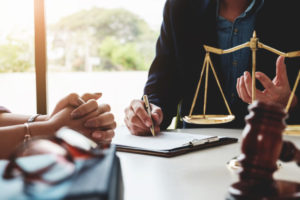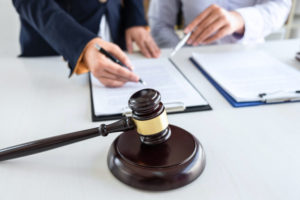
A deposition is an out-of-court Q&A session, similar to a cross-examination, between a lawyer and a witness.
Since deposition witnesses are sworn in, all testimony is under oath, meaning that perjury liability is a possibility for false statements.
Table of Contents
The Pretrial Discovery Process

The pretrial discovery process takes place after a lawsuit is filed but before a trial.
Its purpose is to help each party obtain evidence that is in possession of the opposing party or a third party.
Discovery includes four main tools:
- Depositions;
- Interrogatories — written questions that the opposing party must answer in writing;
- Requests for production – demands for access to physical evidence and documents; and
- Requests for admissions of relatively unimportant facts that the requesting party doesn’t want to bother proving.
A successful discovery process can often lead to a settlement when the evidence gathered provides one party with enough bargaining power to virtually compel a settlement.
Who Attends a Deposition?
The parties at a deposition include:
- The deponent (the witness who will be questioned);
- Attorneys for both sides; and
- Someone qualified to administer an oath to the deponent.
Although a court recorder might be present to record the deposition, electronic recording is increasingly common. Judges do not normally attend depositions.
Objections to Inappropriate Questions
Since judges do not normally attend depositions, neither side’s lawyer can object to a question and have the judge sustain or overrule the objection. What an attorney can do, however, is note an objection on the record and ask the court to exclude the transcript of the question and answer from evidence at trial.
The Purposes of Holding a Deposition
Some of the main purposes of holding a deposition include:
- Evaluating witnesses for knowledge, credibility, and persuasiveness;
- Collecting information about the witness’s testimony (their side of the story, for example);
- Identifying key documents and possible additional witnesses;
- “Locking in” the witness’s testimony, since if they testify differently at trial, you can use the contradiction to discredit them;
- Identifying the opposing party’s strategy and claims.
- Establishing the authenticity of key documents and evidentiary exhibits; and
- Identifying themes and theories that you might be able to use.
In a nutshell, depositions help prevent “trial by ambush,” where one party surprises the other party at trial.
Obtaining Testimony From Witnesses Who Cannot Appear at Trial
Key witnesses cannot always appear at trial for a variety of reasons. Some of the most common reasons include:
- The witness is too ill to attend;
- The witness will be out of town during the trial; or
- The witness will be unavailable for some other reason that the court accepts.
You should depose any key witness just in case something happens that prevents them from testifying. If the court permits, you can still use the court reporter’s transcript of their deposition testimony as evidence in court.
Can You Subpoena Witnesses?
A subpoena is a court order that compels a witness to attend the deposition and answer questions. Yes, you can subpoena witnesses in a personal injury case. The witness can appeal to the court to ”quash” the subpoena. If the court denies the motion to quash, the witness must attend the deposition and answer questions or risk a contempt of court charge.
What Kinds of Questions Can You Ask at a Deposition?
You enjoy a broader scope of questioning at a deposition than at trial because either side can ask any question calculated to lead to admissible evidence. If you are suing a defendant for sexual assault, for example, you can ask questions about the defendant’s past consensual relationships even if the defendant’s answer would be inadmissible in court.
How To Testify If You are Deposed
Following are some tips on how to handle a deposition if the opposing party deposes you:
- Practice answering questions in advance with your lawyer. By the date of the deposition, you should know all of your answers by heart.
- Bring your lawyer to the deposition with you.
- Ask your lawyer to signal when you should refuse to answer a question.
- Tell the truth – you are under oath.
- Don’t volunteer any information. If nobody asks you, don’t answer.
- Keep your answers short and concise. Long answers tend to include more information than the opposing party asked for, which is almost always a bad idea.
- Don’t rely on notes unless your lawyer has reviewed and OK’d them. If you rely on notes, the opposing party has the right to see them.
- Listen carefully to all questions and ask for clarification if you need it.
- Don’t say anything inconsistent with a prior answer so that the opposing party cannot discredit you by accusing you of contradicting yourself.
Speak with your lawyer for more tips on answering questions at a deposition.
You Will Need a Clearwater Personal Injury Lawyer Every Step of the Way
You probably wouldn’t want to testify in court without a lawyer. Likewise, it is unwise to attend a deposition as a witness without a lawyer by your side. Since most Clearwater personal injury lawyers offer free consultations, you have little to lose by discussing your claim with a lawyer.
Call us today at (727) 796-8282 to talk to an attorney at Perenich, Caulfield, Avril & Noyes Personal Injury Lawyers.